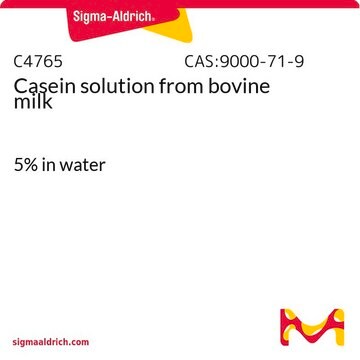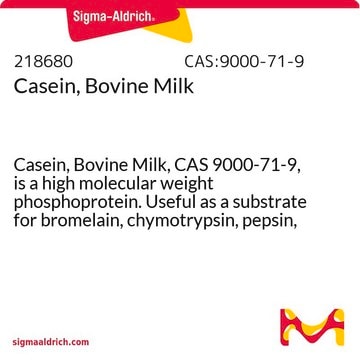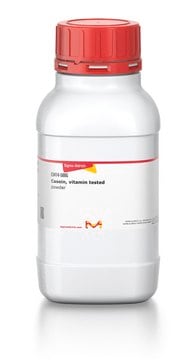C8654
Casein sodium salt from bovine milk
Synonym(s):
Sodium caseinate
Sign Into View Organizational & Contract Pricing
All Photos(2)
About This Item
Recommended Products
biological source
bovine milk
Quality Level
form
powder
technique(s)
electrophoresis: suitable
immunocytochemistry: suitable
ligand binding assay: suitable
color
white to yellow
solubility
H2O: soluble 50 mg/mL, Grade III
Looking for similar products? Visit Product Comparison Guide
Application
Casein sodium salt from bovine milk is suitable for use in:
- the preparation of casein-based diets to investigate nutritional effect of vitamin E in diets for Litopenaeus vannamei postlarve
- in an assay to determine the activity of a three-enzyme solution containing trypsin, chymotrypsin and peptidase
- a study to investigate the effects of bovine somatotropin (bST) administration and abomasal casein infusion on nitrogen metabolism in Holstein steers
- as constituent of blocking solution in immunoblotting.
Biochem/physiol Actions
α-Casein can be an immunogen in young children, and anti-α-casein antibodies have strong cross-reactivity with insulin. This effect can explain the uncommon insulin autoimmunity, but it does not appear to progress to Type I diabetes.
Casein sodium salt from bovine milk is a phosphoprotein. There are four main types of Casein which make up approximately 80% of the total protein in bovine milk: α-s1 Casein, α-s2 Casein, β-Casein, and κ-Casein. Casein is proposed to be the main protective constituent in milk.
Storage Class Code
11 - Combustible Solids
WGK
WGK 3
Flash Point(F)
Not applicable
Flash Point(C)
Not applicable
Personal Protective Equipment
dust mask type N95 (US), Eyeshields, Gloves
Choose from one of the most recent versions:
Certificates of Analysis (COA)
Lot/Batch Number
Don't see the Right Version?
If you require a particular version, you can look up a specific certificate by the Lot or Batch number.
Already Own This Product?
Find documentation for the products that you have recently purchased in the Document Library.
Customers Also Viewed
Kristin Røen Fauske et al.
Nutrients, 10(6) (2018-06-01)
A large fraction of the n-3 polyunsaturated fatty acids (PUFAs) in cod fillet is present in the form of phospholipids (PLs). Freezing initiates hydrolysis of the PLs present in the fillet. Here, we compared the effects of Western diets based
Rinke J van Tatenhove-Pel et al.
The ISME journal, 15(10), 3050-3061 (2021-05-07)
As natural selection acts on individual organisms the evolution of costly cooperation between microorganisms is an intriguing phenomenon. Introduction of spatial structure to privatize exchanged molecules can explain the evolution of cooperation. However, in many natural systems cells can also
Lene Secher Myrmel et al.
Nutrients, 11(5) (2019-05-28)
Low-fat diets and energy restriction are recommended to prevent obesity and to induce weight loss, but high-protein diets are popular alternatives. However, the importance of the protein source in obesity prevention and weight loss is unclear. The aim of this
Farzad Sadeghi et al.
Carbohydrate polymers, 179, 71-78 (2017-11-08)
In this study, the phase behavior of sodium caseinate-Persian gum mixtures was investigated. The effect of thermodynamic incompatibility on phase distribution of sodium caseinate fractions as well as the flow behavior and microstructure of the biopolymer mixtures were also studied.
C A Downs et al.
PloS one, 8(12), e77173-e77173 (2013-12-11)
Coral bleaching is a significant contributor to the worldwide degradation of coral reefs and is indicative of the termination of symbiosis between the coral host and its symbiotic algae (dinoflagellate; Symbiodinium sp. complex), usually by expulsion or xenophagy (symbiophagy) of
Our team of scientists has experience in all areas of research including Life Science, Material Science, Chemical Synthesis, Chromatography, Analytical and many others.
Contact Technical Service











